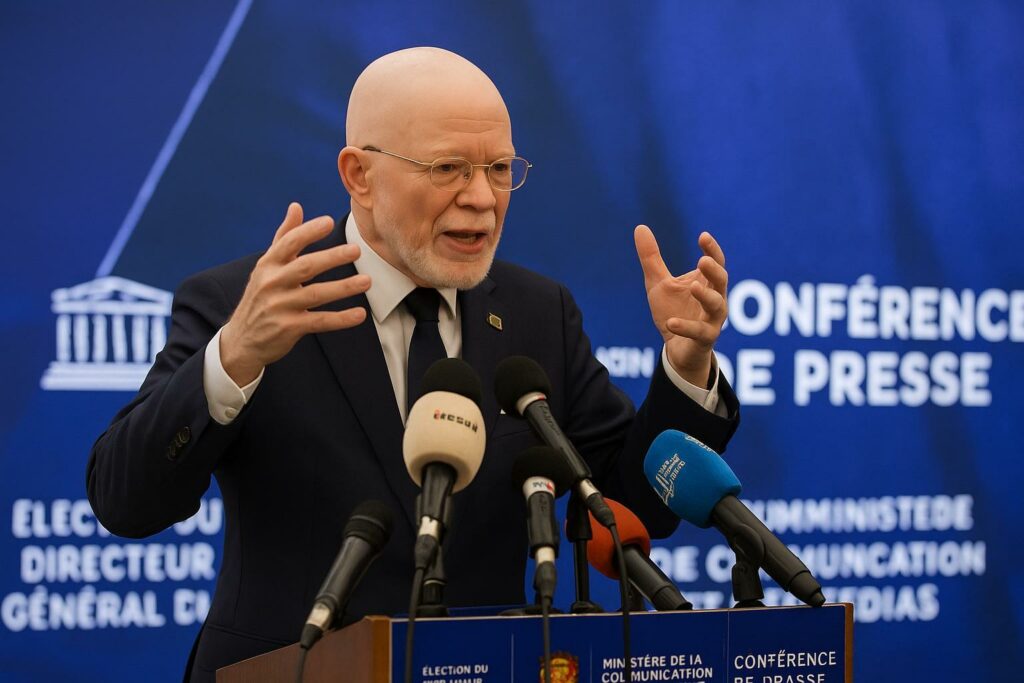Brazzaville’s Strategic Messaging
A few minutes past noon in the business lounge of the Hilton Brazzaville, Minister of Communication and Media Thierry Moungalla rose before a packed hall of local and foreign reporters and reaffirmed, with deliberative calm, the Republic of Congo’s “unshakable support” for Firmin Édouard Matoko in the forthcoming election of the UNESCO director-general. The statement, delivered on 5 September 2025, came amid a faint hum of cameras and laptops, attesting to the regional resonance of the contest. Flanked by Claudia Ikia Sassou-Nguesso, Special Adviser to the Head of State, the government spokesman framed the press encounter as a pivotal moment in a long diplomatic marathon that began months earlier in capital cities across Africa, the Arab world and beyond.
Moungalla’s declaration was explicit: Brazzaville is rallying behind a candidature that, in its view, incarnates both institutional memory and transformative ambition. By publicly consolidating that stance, the minister also sought to dispel speculation about wavering support or external pressures. “One voice, that of France, cannot eclipse the fifty-six others yet to be convinced,” he observed, placing Congo’s lobbying campaign within a broader multilateral calculus.
A Candidate Shaped by UNESCO
Firmin Édouard Matoko’s entire professional trajectory has unfolded under the UNESCO flag, providing him, in Moungalla’s estimation, with a granular understanding of the organisation’s administrative architecture and normative instruments. The minister painted the Congolese contender as “a man of dialogue, a visionary servant of the United Nations, committed to a stronger, people-centred and audacious UNESCO.” According to Brazzaville’s narrative, these attributes position Matoko to reconnect the institution with its founding mandate—promoting peace through education, science and culture—while placing special emphasis on Africa’s demographic dynamism and the aspirations of global youth.
Such credentials, heavily underlined in the minister’s briefing, are intended to resonate with the fifty-eight members of the Executive Board who will cast the decisive preliminary ballots on 6 October 2025. Moungalla contended that familiarity with internal procedures, coupled with an inclusive leadership style, could tip the scale in Matoko’s favour despite an Egyptian rival benefiting from public French endorsement.
Continental Stakes and the Unity Narrative
One of the leitmotifs of the press conference was Africa’s assured victory, whichever candidate ultimately emerges. By stressing that both finalists hail from the continent, Moungalla inserted Congo’s campaign within a pan-African storyline. The approach is both diplomatic and strategic: it mitigates perceptions of intra-African rivalry and pre-empts narratives of division that opponents might exploit in the crucial weeks ahead.
The government spokesman nevertheless rejected notions that the African Union had already designated a sole standard-bearer. “The process is multilateral,” he insisted, implying that national diplomacies retain room for manoeuvre until the ballots are actually cast. In the corridors of Hilton Brazzaville, aides spoke of recent missions by Prime Minister Anatole Collinet Makosso and Foreign Minister Jean-Claude Gakosso aimed at translating this continental rhetoric into concrete pledges, one vote at a time.
The Road to Tashkent
Procedurally, the election will unfold in two distinct phases. The Executive Board’s vote in early October will produce a single name, to be forwarded to UNESCO’s General Conference convening in Tashkent from 30 October to 13 November 2025. The formal appointment is scheduled for 6 November. Moungalla portrayed this timeline as both an opportunity and a discipline test: each handshake, phone call and policy brief between now and October could recalibrate the arithmetic.
Despite acknowledging the competitive prowess of Egypt’s campaign machinery, the minister projected quiet confidence. He cited the “coherent diplomatic choreography” orchestrated by Brazzaville—high-level visits, thematic seminars, and targeted media engagements—as evidence that the Congolese bid is not merely symbolic. In his words, the goal is “to rally around a project that speaks to the future of multilateralism, one that is inclusive, culturally rooted and technologically forward-looking.”
Key Takeaways
For the Congolese government, Matoko’s candidacy transcends personal ambition; it is presented as an affirmation of Congo’s constructive multilateral identity under President Denis Sassou Nguesso. By foregrounding themes of youth empowerment, cultural diversity and institutional renewal, Brazzaville seeks to align national prestige with global public goods.
Moungalla’s assessment that “Africa will have won regardless of the outcome” offers a diplomatic buffer while the real-time arithmetic of 58 votes unfolds. Yet the underlying message remains unequivocal: Congo intends to fight for every ballot until the gavel falls in Tashkent. Whether that effort crystallises into the first Congolese director-general in UNESCO’s history now rests on corridors conversations, strategic partnerships and, not least, the persuasive narrative crafted in the Hilton press room on a September afternoon in Brazzaville.

